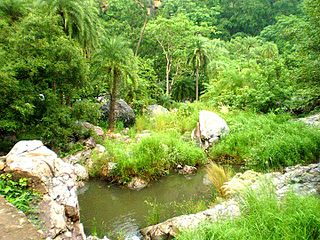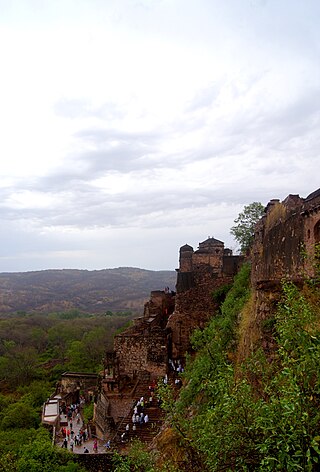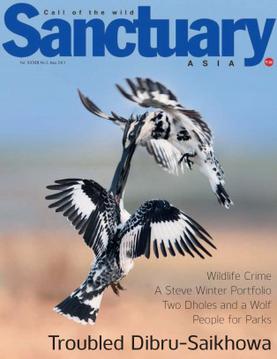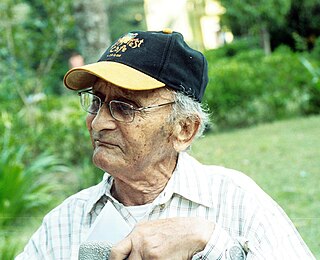Frederick Walter Champion was a British forester, who worked in British India and East Africa. In the UK and India he became famous in the 1920s as one of the first wildlife photographers and conservationists.

Romila Thapar is an Indian historian. Her principal area of study is ancient India, a field in which she is pre-eminent. Thapar is a Professor of Ancient History, Emerita, at the Jawaharlal Nehru University in Delhi.

Chauhan, a name derived from the historical Chahamanas, a clan name associated with various ruling Rajput families in the present-day Indian state of Rajasthan from seventh century onwards.

Ranthambore National Park is a 1,334 km2 (515 sq mi) large national park in the Indian state of Rajasthan. It is bounded to the north by the Banas River and to the south by the Chambal River. It is named after the historic Ranthambore Fort, which lies within the park.

Sariska Tiger Reserve is a tiger reserve in Alwar district, Rajasthan, India. It stretches over an area of 881 km2 (340 sq mi) comprising scrub-thorn arid forests, dry deciduous forests, grasslands, and rocky hills. This area was preserved for hunting, for the Alwar state and was declared a wildlife sanctuary in 1958. It was given the status of a tiger reserve making it a part of India's Project Tiger in 1978. The wildlife sanctuary was declared a national park in 1982, with a total area of about 273.8 km2 (105.7 sq mi). It is the first reserve in the world with successfully relocated tigers. It is an important biodiversity area in the Northern Aravalli leopard and wildlife corridor.

Hammiradeva was the last ruler from the Ranthambore branch of the Chauhans (Chahamanas). He is also known as Hamir Dev Chauhan in the Muslim chronicles and the vernacular literature.

Kailash Sankhala was an Indian biologist and conservationist. He was the director of Delhi Zoological Park and chief wildlife warden of Rajasthan. He is best known for his work in preserving tigers. Sankhala was the first director of Project Tiger, a conservation programme set up in India in 1973. He was well known as "The Tiger Man of India". He was awarded the Padma Shri in 1992 and Rajasthan Ratan in 2013.

Ranthambore Fort lies within the Ranthambore National Park, near the city of Sawai Madhopur in Sawai Madhopur district of Rajasthan, India. the park being the former hunting grounds of the Maharajahs of Jaipur until the time of India's Independence. It is a formidable fort having been a focal point of the historical developments of Rajasthan. The Ranthambhore fort is believed to have been built during the 5th century by Yadavas ruler Maharaja Jayant. The Yadavas king ruled over it till they expelled by Prithviraj Chauhan in 12th century.The fort was occupied by Sultans of Delhi.Later on, It came under control of Merwar and Mughals.The fort provides a panoramic view of the surrounding Ranthambore National Park and is now a popular tourist attraction.

Sanctuary Asia is an Indian nature and wildlife conservation magazine founded in 1981 by Bittu Sahgal, its current editor. The magazine expanded in 2015 to become established as a non-profit foundation.

Kunwar "Billy" Arjan Singh was an Indian hunter turned conservationist and author. He was the first who tried to reintroduce tigers and leopards from captivity into the wild.

Sanjana Kapoor is an Indian theatre personality and former film actress. She is the daughter of actors Shashi Kapoor and Jennifer Kapoor. She ran the Prithvi Theatre in Mumbai from 1993 to February 2012.

Land of the Tiger is a BBC nature documentary series exploring the natural history of the Indian subcontinent, first transmitted in the UK on BBC Two in 1997. The production team covered the breadth and depth of India, from the Himalayan mountains in the north to the reef-fringed islands of the Indian Ocean, to capture footage of the country's wild places and charismatic wildlife.
Romesh Thapar (1922–1987) was an Indian journalist and political commentator. Affiliated with the Communist Party of India (Marxist), Thapar was the founder-editor of the monthly journal Seminar, published from New Delhi, India.

General Pran Nath Thapar was the fourth Chief of Army Staff of the Indian Army. The Sino-Indian War was fought during his term, in which the Indian Army fared poorly. Thapar resigned during the last stages of the war, handing charge to Lt. Gen. J. N. Chaudhuri.

Fateh Singh Rathore was an Indian tiger conservationist. Fateh Singh joined the Indian Forest Service in 1960 and was part of the first Project Tiger team. He was widely acknowledged as the tiger guru for his legendary knowledge of the big cat. He worked over 50 years in wildlife conservation. Rathore was noted for his pioneering relocation of villages from inside the Ranthambhore National Park in 1973–75. Largely because of Mr. Rathore, "Ranthambhore became the place which brought the tiger to the consciousness of people the world over."

T-24, also called Ustad, was a tiger who lived in Ranthambore National Park, India, killed four humans and sired four tigers.

Machali, also known as Machli or Machhli, was a Bengal tigress who lived in Ranthambore National Park in India. She was born in the spring of 1997, and died on 18 August 2016.
Chhan is a village in the Sawai Madhopur district of Rajasthan, India. It is identified with Jhain, which is mentioned in the Delhi Sultanate chronicles as an important town of 13th and 14th century India.

Aleph Book Company is an Indian publishing company. It was founded in May 2011 by David Davidar, a novelist, publisher and former president of Penguin Books Canada, in association with R. K. Mehra and Kapish Mehra of Rupa Publications. The headquarters of the company is situated in New Delhi.
Aditya 'Dicky' Singh was an Indian wildlife conservationist and wildlife photographer.

















